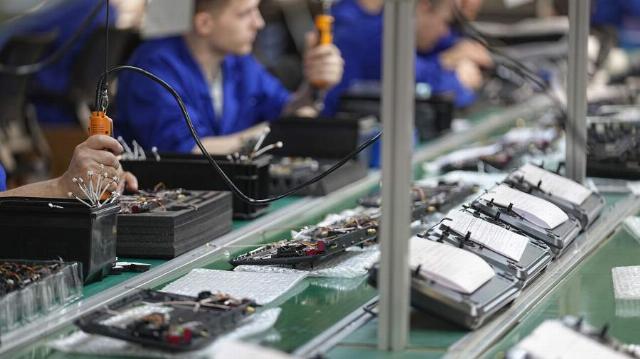Centralization will help to quickly and competently build a strategy for using UAVs in the area of a military special operation.
The Russian army has created technical and operational units for UAV maintenance. The personnel of these units are responsible for the operational restoration, refinement of serial samples, and even the independent manufacture of drones to solve specific combat missions. Experts note that centralization will not only improve drone repair and accelerate the introduction of innovations, but will also help to quickly and competently build a strategy for the use of unmanned vehicles throughout its area.
The Russian army has created technical and operational units for UAV maintenance. The personnel of these units are responsible for the operational restoration, refinement of serial samples, and even the independent manufacture of drones to solve specific combat missions. Experts note that centralization will not only improve drone repair and accelerate the introduction of innovations, but will also help to quickly and competently build a strategy for the use of unmanned vehicles throughout its area.
Specific tasks for UAVs
Technical and operational units of the UAV were created in every association, compound and military unit of the Russian group operating in the zone of a special military operation. Non-standard workshops and technical support groups were also organized. Their personnel are primarily responsible for repairing damaged drones, including captured ones. At the same time, in order to increase the effectiveness of the use of drones, systematic work has been organized to introduce new technologies and improvements, sources in the Russian Defense Ministry told Izvestia.
Izvestia's interlocutors clarified that existing models are being upgraded in these units in accordance with the specifics of the theater of military operations. If necessary, special samples of equipment are produced that allow solving specific combat missions.
The troops operate a large number of unmanned systems, so they cannot do without repair shops, military expert Alexei Leonkov told Izvestia.
"At the beginning of the military special operation, most of the UAVs — primarily, of course, the copter type — were supplied by volunteers," he recalled. — They also served them. And a lot of things related to drones happened spontaneously three years ago. UAVs are now playing a big role in the war zone, they are being massively used, and their number will only grow. It is logical that they decided to create technical support groups for them. We can say that this is an initiative from below, which was eventually supported at the top.
Improve the efficiency of using drones
Any drone is a technically complex device, and its performance depends on the quality of the assembly, as well as on the preparation for flight, Sergei Kurapov, a senior researcher at the Research Institute, who is actively involved in the maintenance of UAVs in the free zone, told Izvestia.
"Without such units, the operator would spend most of his time repairing and maintaining the devices," he explained.
According to the expert, currently there is a need in the army to create full-time units of technical and operational UAV units with coordination of efforts in a single center.
The centralization of technical support will help solve many of the problems that our troops are facing, says Sergey Kurapov.
"It is important that such units receive sufficient flexibility and autonomy — this will allow them to quickly adapt to changing conditions," he said. — As a result, we will be able to receive information about the use of new tools by the enemy as quickly as possible, and implement our innovations with high speed. And the most important thing is to build a strategy for the use of unmanned vehicles, electronic warfare (EW) and electronic intelligence (RER) within the framework of the entire military.
The expert also noted that the new staffing table of the Russian Armed Forces units will allow "avoiding many legal conflicts" related to the positions of fighters in the UAV service groups.
"They were listed as anyone," he noted. — And at some point they could have received an order to go into battle according to their state.
This led to the loss of valuable, trained personnel. Now such problems should not arise, the expert noted.
Troops of unmanned systems
Izvestia wrote that troops of unmanned systems will be created in the Russian Armed Forces in accordance with the instructions of the Supreme Commander-in-Chief. They will appear in the third quarter of 2025. The head of the Defense Department, Andrei Belousov, said that the massive use of unmanned aerial vehicles (UAVs) was "the most significant breakthrough in the tactics of the units" of the Russian Armed Forces.
He instructed to focus efforts on improving the tactical and technical characteristics of unmanned aerial vehicles, systematically conduct their field tests and organize the serial production of the best samples.
The Russian Defense Ministry reported that Russian troops use more than 3,500 drones every day, and this figure is constantly growing. According to the head of the military department, a huge number of innovative technical developments are currently being carried out directly in the troops, showing high results.
Earlier, Russian President Vladimir Putin spoke about the need to increase the production of drones. According to the head of state, it is equally important to train UAV operators and train them according to programs developed based on combat experience.
Izvestia reference
In the army, technical support units perform the tasks of repairing, upgrading and configuring supplied drones, and developing new types of unmanned vehicles.
They are also engaged in the development and manufacture of peripheral devices for UAVs, such as vents. They are responsible for the creation and repair of communication equipment, such as repeaters or remote antennas.
An important function of such units is technical intelligence, that is, the study, analysis and systematization of enemy equipment and experience, the development of means to counter enemy UAVs in the field.
Bogdan Stepovoy
Julia Leonova
Andrey Fedorov

